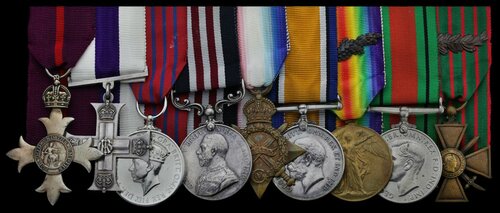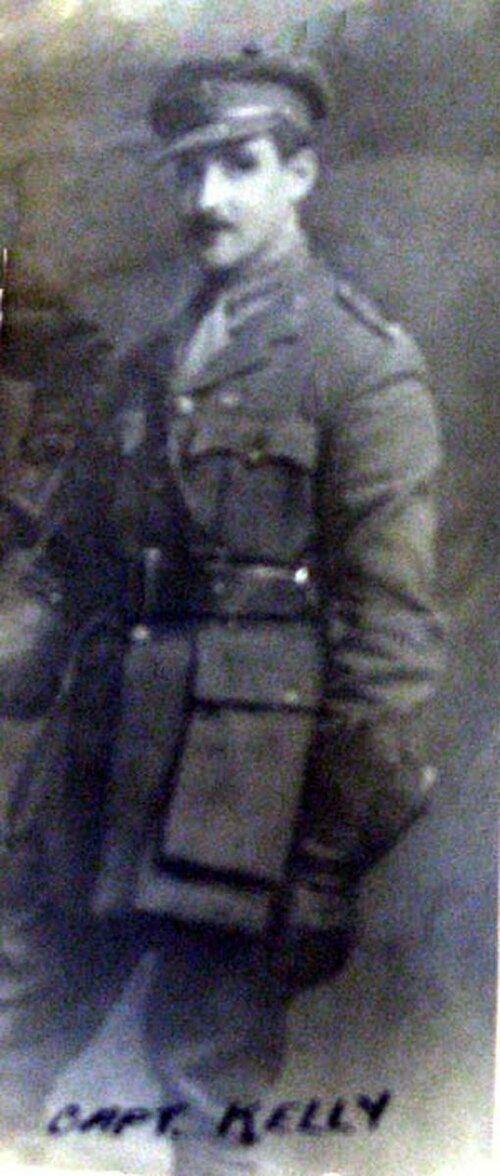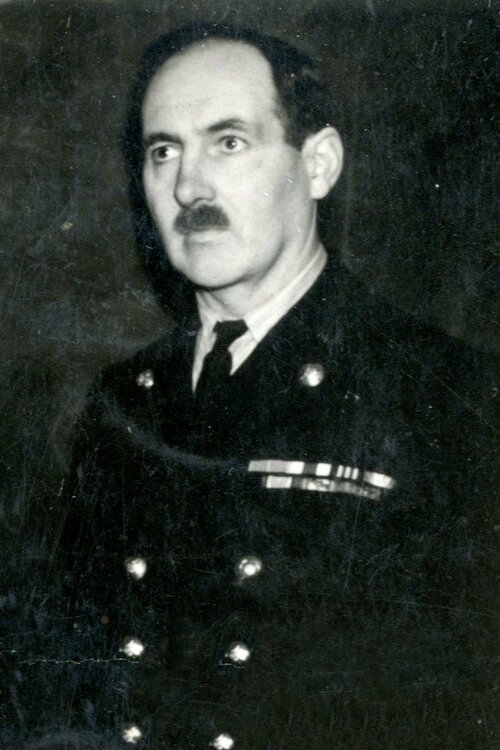Auction: 20003 - Orders, Decorations and Medals
Lot: 250
An outstanding and rare Ireland 'Special Intelligence Operations' O.B.E., Western Front 1918 M.C., Second War 1940 'Coventry Blitz' G.M., 'Passchendaele 1917' M.M. group of nine awarded to Captain C. Kelly, Royal Artillery, who was stationed at Victoria Barracks, Cork, where one of his tasks was to interrogate captured I.R.A. Terrorists, 1919-22
Having been thrice decorated, wounded and having been granted a battlefield commission during the Great War he spearheaded the British Intelligence Section; the colourful Kelly was atop a 'hit list' for the I.R.A. who on several occasions made attempts on his life to stop his wide-ranging 'activites' against the Republicans
The Most Excellent Order of the British Empire, 1st type, Military Division, Officer's (O.B.E.) breast Badge, silver-gilt (Hallmarks for London 1919), the reverse privately engraved 'Lt. C. Kelly'; Military Cross, G.V.R., the reverse privately engraved '2/Lt. Campbell Kelly R.G.A.'; George Medal, G.VI.R. (Campbell Joseph Kelly O.B.E. M.C. M.M. (Replacement)); Military Medal, G.V.R. (34071 Sgt: C. Kelly. 185/Sge: By: R.G.A.); 1914-15 Star (34071 Bombr. C. Kelly R.G.A.); British War and Victory Medals, with M.I.D. oak leaves (2. Lieut. C. Kelly.), initial corrected on BWM; Defence Medal 1939-45; France, Third Republic, Croix de Guerre, reverse dated 1914-1918, with bronze palm on riband, mounted court-style as worn, good very fine (9)
O.B.E. London Gazette 1 January 1923.
M.C. London Gazette 24 September 1918:
'For conspicuous gallantry and devotion to duty. While out with a patrol he encountered a strong hostile party, who bombed him, but by using his revolver he succeeded in getting away and bringing back information. Again he did excellent work with a party of gunners, with rifles, in holding up the enemy while the guns were being withdrawn. He frequently returned to the battery under heavy fire to obtain further supplies of ammunition, though at the time he was suffering from the effects of gas.'
G.M. London Gazette 28 January 1941 (Control Officer, Works Air Defence Department, Coventry):
'Mr. Kelly's organisation and personal bearing have been largely responsible for the building up of a highly efficient Works Air Raid Defence team. His personal activities on the night of an intensive air raid were largely instrumental in saving his factory from destruction. He extinguished an incendiary bomb and immediately afterwards took twelve volunteers to help the City Fire Service deal with a serious fire. After that, they attended at another fire and on the way back helped to extricate the bodies of policemen who were trapped in debris left by high explosive bombs. A large high explosive bomb hit a works shop but fire was avoided by prompt action under Kelly's guidance. Until five o'clock in the morning Kelly continued to give inspiring leadership to his men. There was no cover for any of the working parties and they all carried out what was asked of them with fortitude and courage.'
M.M. London Gazette 12 December 1917.
Croix de Guerre London Gazette 7 January 1919.
Campbell Joseph Kelly was born in Ireland in September 1892 and enlisted in the Royal Garrison Artillery in November 1910. Serving on the Western Front - and probably in South Africa - during the Great War, he was wounded and earned his M.M. at Passchendaele in 1917, before earning a battlefield commission on 7 January 1918. By war's end, he had added the M.C. and Croix de Guerre to his laurels for service alongside the French Fifth Army.
On the conclusion of the Great War he returned to his homeland with a Special Appointment in the Intelligence Department of Irish Command in May 1919. Serving with the 6th Division based at Victoria Barracks, Cork he headed the interrogation unit as Intelligence Officer of the Brigade, often working alongside Major Arthur Percival and assisting the 'Essex Torture Squad' that he led. One former IRA Commandant-General said:
'Percival was a sadist and was indeed present at some of the torturings, to my knowledge, but he was ably assisted by Captain Kelly.'
From the outset of their work both were wanted men and their movements were tracked, initially due to the fact Josephine Marchmont, who was his stenographer, was an IRA spy (she later married Florrie O'Donoghue) who passed much intelligence direct to the opposition. Further details of his life and the wishes of the IRA to remove him follow:
'One of the most. dangerous and efficient intelligence officers employed by the British was Major Campbell-Kelly who was employed as Head-Bailiff by the Killarney Board of Fishery Conservators and lived at Fuchsia Cottage, Glenbeigh, on the lovely coast of Dingle Bay. Glenbeigh and its environs is a beautiful holiday resort with two comfortable hotels situated in the midst of grand mountain scenery on the Coast of Dingle Bay and a few miles west of Killorglin, the home of the famous Puck Fair. It is a well-known fishing centre which embraces Caragh Lake and River and the Laune Fisheries as veil as a number of other smaller rivers.
Apparently G.H.Q. I.R.A. Intelligence got word that Kelly was operating in West Cork in Tom Barry's area and that he was from Glenbeigh, County Kerry. Collins communicated with me and gave me an outline of his history. He ascertained that his father had been in the R.I.C. in Clare or Galway where he married a lady of family named, as well as I remember, Vandeleur, that the lady's parents had him dismissed from the R.I.C. The son was brought up by the MacGillycuddy of the Reeks and Kelly joined the British Army at the outbreak of the South-African War and served through the campaign. Eventually he rejoined the Army during World War I and became a Major, and when he retired he got the job of Head Bailiff to the Killarney Board of Fishery for Glenbeigh district. Apparent he used to visit the McGillycuddys at Carntuoghill and Major John McGillycuddys at Ballinagrown near Annascaul where he formed the spy ring which included Daly of Caherpierse. Daly gave the names of the other membersof the ring who were all cousins and worked from time to time for Major McGillycuddy at Ballinagrown. Others in the ring were John Hennessy of tougher and a man named Clifford of Farnes, Castlemaine. Both mothers of the latter were aunts of the Daly who was executed. When Mick Collins wrote me about Kelly I went to Glenbeigh to see TomEvans, a friend of mine, and in reply to my enquiry he produced a photo of Campbell-Kelly as a Corporal in the British Army during the South African War. In this photo he had a scar over one of his eyes and he still carried the distinguishing mark. John Hennessy went to the United States after the execution of his cousin Daly, and Clifford, who had been shot in the leg previously for reporting to the R.I.C. about a summons he got to attend a Sinn Féin Court at Killorglin, was spirited away by the Auxiliaries from the County Infirmary, Tralee, before the I.R.A. could get hold of him. A number of spies of the photo were circulated throughout the Kerry Brigades and I suppose to other units as well.
Apparently Kelly had succeeded in joining an I.R.A. Column in Cork and actually took part in some operations against British Forces. In one ambush he managed to get away before it was over and got to British headquarters in Kanturk or Buttevant whence he led the British expeditionary force to capture the I.R.A. column under Tommy Barry. I got on his track very quickly and alerted all units in my area to have a took-out for him and, though I tracked him to places in Kerry, I never succeeded in getting within striking distance of him. He always succeeded in getting away before we were able to reach him. On one such occasion he was at Lady Gordon's of Caragh Lake where he met Gobnait Ni Brudair (Lady Broderick) and tried to find out and contact the Brigade I.O. to Kerry I. Luckily, she did not tell him but came to me early the following day. She was astonished when I told her his history and he had moved on before we got to Lady Gordon's. On another occasion he stayed at the International Hotel, Killarney, as a priest and contacted a commercial traveller staying there whose brother was a battalion officer in County Cork. He stayed in the bar all the evening till about 11 p.m. with the traveller but did not succeed in getting the information he wanted. At times he used "soldier's language" in the bar and that made the other man suspicious. The boots the late John Keogh who was acting as Brigade I.O. to Kerry II, spotted the scar over his eye and remembered the man in the photograph. He sent me a message the following day but the bird had flown and his bed had not been slept in. I discovered afterwards that he stayed with Major McGillcuddy at Flesk Castle where they lived after their house at Ballinagrown had been burnt down accidentally. Kelly was a very clever Intelligence Officer. His second brother was in the Tans and eventually Kelly and a young son had to take refuge in Dublin Castle till the end of the war, when they cleared out.'
Kelly led a raid on Rahanisky House on 7 February 1921and captured 14 members of the ASU. It was that unit who struck back on 23 May in their attempt on the life of Kelly:
'2 groups of the ASU had taken up positions along Washington St. An Intelligence Officer was placed some 50 yards beyond myself and another man. 3 other members of the ASU were placed about 75 yards below my group. Capt Kelly came from the jail in an open car on this particular morning. And he had practically passed the intelligence officer before he was recognised. When we got the signal, the car had already passed us. And we signalled to the men further down. The car was going so fast that it was practically past them before they threw the bombs. One bomb was thrown into the car but failed to explode. The second bomb hit the roof of the car and rolled off onto the roadway. Some shots were also exchanged, but Kelly escaped.
Kelly resigned his Special Appointment in May 1922 and was awarded his O.B.E. in the following New Year's Honours List for his 'Special Service in Ireland', being presented the Insignia from the hand of King George V at Buckingham Palace on 1 March being made Adjutant of the Portsmouth Docks Royal Artillery unit in February 1923. He was dismissed from the service by General Court Martial as a result of drawing Army funds for personal use in 1928. By the outbreak of the Second World War, Kelly was living at 35 Clayton Road, Coventry and was appointed Chief Air Warden. Having again distinguished himself during the fateful Coventry Blitz, he won his G.M. for his action on 14 November 1940, the most devastating night of the action on that city. Some 515 German bombers dropped over 500 tonnes of high-explosive and around 36,000 incendiary bombs which cost the lives of 568 civilians, besides most of the city centre and its Cathedral. Having been charged with bigamy in February 1941, he was whisked down to London on 27 May 1941 to receive his Medal and thence died on Valentine's Day 1942. Behind his coffin - draped with the Union Jack, his helmet, belt and axe - the Home Guard carried these Medals and fired three volleys in his honour.
Sold together with letter of congratulations to the recipient on the award of the George Medal from Lord Nuffield, dated 30 January 1941, besides two other letters regarding the award of the George Medal, various telegrams, his International Driving Permit, International Fiscal Permit and copied research housed in a file.
Subject to 20% VAT on Buyer’s Premium. For more information please view Terms and Conditions for Buyers.
Sold for
£7,000
Starting price
£7000









